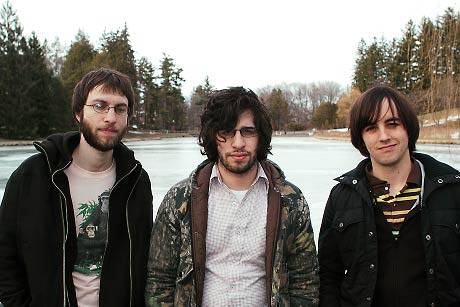Heavy musics most potent and punishing electro thrashers have fulfilled the promise of their critically acclaimed debut album, Cloak of Love, and raised the bar for the legions of imitators undoubtedly about to spawn in the wake of their success. This time around theyve embraced their inner metallic battle-borgs and conscripted them into a robotic army of brain-melting tech wizards hell-bent on world domination. The quirky, candy-coated techno moments that characterised their initial effort take the back line to Converge-style blood curdling, guitar shredding attacks united with battalions of avant-grind and genre hopping sophistication. Their evolution sees riffs mutate flawlessly, taking their writing style into novel territory, building upon the foundations of blitzkrieg. The songs are longer and increasingly focused than those on Cloak of Love, contributing to the overall atmosphere being much darker and disquieting. The electronics are incorporated more as a tool of depth rather than digression, making the tunes heavier and more threatening. Needless to say, Kurt Ballou has once again recorded a masterpiece, highlighting each individual musical component perfectly, texturing a sonic tapestry worthy of the music behind it. Already well on their way to underground superstar status, its just a matter of time before the Tron conquer all.
The song progression and titles themselves suggest a journey of sorts. Is there actually any conceptual framework uniting the album? Vocalist/noisemaker Mookie Singerman: Theres a loose conceptual framework on the record and the song titles certainly play into that. The past two years were a pretty bleak time for all three of us, dealing with some pretty serious health and family issues and a nasty car wreck a couple months before that. We felt like we were all simultaneously losing control of ourselves and our surroundings. The idea of being completely overwhelmed by your environment and having no agency is probably the clearest theme on the record.
Was there any particular impetus for the dramatic shift in your writing style? The songs on Cloak of Love were the first five we ever wrote and we were still very much in the process of figuring out our sound while we were writing and recording it. The result was pretty scatterbrained and exhausting. Even at 12 minutes it was hard to imagine how we would have held peoples interest for much longer than that, so when we sat down to write Dead Mountain Mouth we knew we needed to tighten up our songwriting in order to make 30-plus minutes listenable and engaging. Were always looking to expand on our sound, but not at the expense of good songwriting.
(Crucial Blast)The song progression and titles themselves suggest a journey of sorts. Is there actually any conceptual framework uniting the album? Vocalist/noisemaker Mookie Singerman: Theres a loose conceptual framework on the record and the song titles certainly play into that. The past two years were a pretty bleak time for all three of us, dealing with some pretty serious health and family issues and a nasty car wreck a couple months before that. We felt like we were all simultaneously losing control of ourselves and our surroundings. The idea of being completely overwhelmed by your environment and having no agency is probably the clearest theme on the record.
Was there any particular impetus for the dramatic shift in your writing style? The songs on Cloak of Love were the first five we ever wrote and we were still very much in the process of figuring out our sound while we were writing and recording it. The result was pretty scatterbrained and exhausting. Even at 12 minutes it was hard to imagine how we would have held peoples interest for much longer than that, so when we sat down to write Dead Mountain Mouth we knew we needed to tighten up our songwriting in order to make 30-plus minutes listenable and engaging. Were always looking to expand on our sound, but not at the expense of good songwriting.
